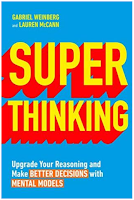Super Models Available Here

Book Review: Gabriel Weinberg and Lauren McCann, "Super Thinking: Upgrade Your Reasoning and Make Better Decisions with Mental Models", Penguin Business, 2019. If you hang around the same corners of the internet as me, there is a chance you've encountered the Farnam Street blog's " latticework of mental models " or the site Conceptually . Both promote the idea that so-called cognitive tools or mental models can enhance one's understanding of the world and help one make better decisions, by importing concepts from various fields and applying them more broadly. Economics, psychology, philosophy, physics, etc. all have their own sets of frameworks, shortcuts and models that help their practitioners explain things and cut through complexity. Yet by taking a multidisciplinary approach and analyzing a problem from different perspectives, we gain a more well-rounded understanding and reduce our blind spots. And with a "latticework of models" w...


